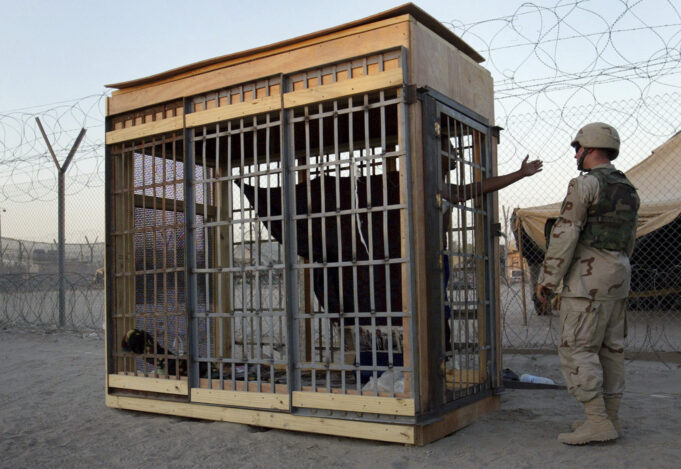President Bush’s Global War on Terror initiated after 9-11 attacks on the World Trade Center seems like an eon ago.
It’s been 22 years since America opened a secret prison in Guantanamo Bay, Cuba. It matters because people are still prisoners there and the U.S. probably still hasn’t learned its lessons.
It matters because these military misadventures cost money and lives and impact quality of life in America, especially for Black folk trying to make it day to day. It matters because these policies eventually create more resentment, enemies and excuses for bloated military budgets.

U.S. hypocrisy and zero moral authority
“With the participation of at least 54 governments, the CIA secretly and extrajudicially transferred at least 119 foreign Muslims from one foreign country to another for incommunicado detention and harsh interrogation at various CIA black sites.
At least 39 of the men were subjected to ‘waterboarding,’ ‘walling,’ ‘rectal feeding’—a form of rape—and other forms of torture,” said the Costs of War in a 2022 report.
“The U.S. military also held thousands of foreign Muslim security detainees and prisoners-of-war—including some women and boys—at its detention centers abroad including Abu Ghraib in Iraq, Bagram Air Base in Afghanistan, and its naval base at Guantánamo, and also subjected many to physical and psychological abuse.”
The U.S. spends more than $540 million per year to detain fewer than 40 prisoners at Guantanamo.
Abu Ghraib: Torture for democracy
The horrors of Abu Ghraib were first exposed by 60 Minutes in 2004. Images surfaced of Iraqi males tortured, abused, dead and even their corpses violated.
Naked bodies of men piled on one another, one Iraqi tied to a leash, terrified prisoners menaced by vicious dogs, prisoners degraded, beaten, sexually assaulted, their rights and manhood violated as military contractors worked with U.S. servicemen to force confessions, extract information and seek control of a chaotic country that should never have been invaded.
Most locked in the horror houses weren’t part of groups fighting the U.S.
An image of a hooded Iraqi, arms outstretched, standing on a box, holding wires seemed to say everything.
In early May, a jury couldn’t reach a unanimous verdict “against a Virginia-based company for its well-documented role in the torture and cruel, inhuman, and degrading treatment of three Iraqi men held in 2003-2004 at the infamous Abu Ghraib prison.
The lawsuit was filed in 2008 by Iraqi torture victims against CACI Premier Technology Inc., a private contractor the U.S. government hired to provide interrogation services at Abu Ghraib after it invaded Iraq in 2003,” said the Center for Constitutional Rights, which represented the men, who may seek a retrial.
Lawyers “presented extensive evidence of CACI’s role in the torture and cruel, inhuman, and degrading treatment they suffered, including the findings of U.S. military investigators that CACI employees had conspired with U.S. soldiers to ‘soften up’ detained Iraqis,” the center continued.
CACI argued “only the military bears any responsibility for the cruelty Iraqi detainees suffered there,” explained center Atty. Katherine Gallagher. “This is not what the law says, and CACI should be held responsible for its employees’ role in the abuses.”
Some are still uncovering the depth of abuses in Afghanistan, where America lost the longest war in her history.
U.S.-backed Afghan government corruption, kidnappings, executions, disappearances, and extortion facilitated America’s loss to the Taliban despite vast expenditures of blood and treasure.
The other costs of war
President Biden announced the war’s end in 2021 and the world watched a chaotic withdrawal: “After more than $2 trillion spent in Afghanistan—a cost that researchers at Brown University estimated would be over $300 million a day for 20 years in Afghanistan,” he said.
“Unlike all previous U.S. wars, the post-9/11 wars were funded without higher taxes or non-war budget cuts, and through a separate budget,” wrote Linda Bilmes in January for JustSecurity.org. “The post-9/11 war funding pattern was completely different. For the first time since the American Revolutionary War, war costs were covered almost entirely by debt.”
The Afghan and Iraqi conflicts together are “the most expensive wars in United States history” costing $4 trillion to $6 trillion, including “long-term medical care and disability compensation for service members, veterans and families, military replenishment, and social and economic costs,” reported the Economics of Peace and Security Journal.
About half of the Pentagon budget goes to private contractors working for a bureaucracy that couldn’t pass an audit, observed progressive Senator Bernie Sanders.
The National Priorities Project’s “A Better World is Possible (and Affordable)” analysis offers us an alternative: A $100 billion annual cut to military spending could mean 10 times as many households receiving public housing. More than 1 in 3 children aged 0-5 going to Head Start.
Nearly 1 in 3 veterans receiving medical care. More than 7 in 10 uninsured adults receiving health care. Solar power for every household in the U.S. with billions of dollars to spare.
“Over the long term, reinvesting in human needs over militarism could be transformative. For far less than the $2.1 trillion spent on militarism in the 20 years after 9/11,” the group said.
It would be tempting to say atrocious acts during war and obscene military spending tarnish America’s soul, but she’s never had one.
These are your tax dollars at work.
Think about that as you look at dilapidated apartments, houses, storefronts and shuttered, hulking former big box stores, drug stores and bank facilities opened to fanfare and closed causing more blight and fueling no progress.
Naba’a Muhammad is an award-winning Final Call editor.













